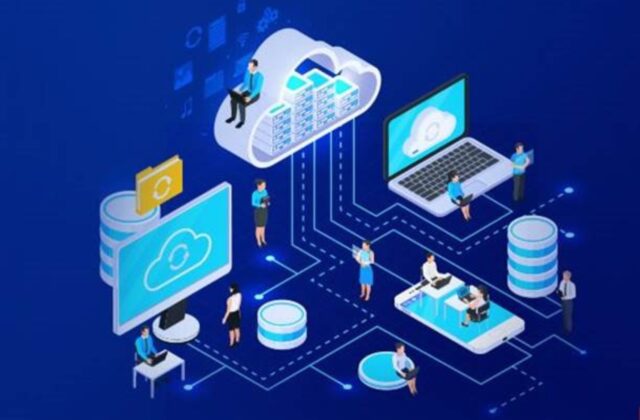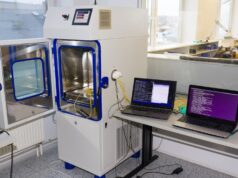
In today’s fast-paced business landscape, the reliance on technology has never been more pronounced. As companies strive to stay ahead, they are constantly seeking solutions that can enhance their operational efficiency. One such solution that has gained traction is the concept of hosted desktop environments.
The Evolution of Workspaces
Gone are the days when employees were tethered to their desks in traditional office setups. These setups, while familiar, came with their own set of limitations, especially in terms of scalability and adaptability. With the rise of the digital age, there has been a significant shift towards remote and flexible work arrangements.
This change has underscored the need for digital workspaces that are both adaptable and accessible. Enter the world of hosted desktop environments. In fact, many businesses are now turning to solutions like Hosted Desktop Services UK to cater to this evolving need.

Decoding Hosted Desktop Environments
So, what exactly is a hosted desktop environment? At its core, it’s a system that stores everything you’d typically find on a traditional desktop – from operating systems and files to emails and applications. However, instead of being confined to a physical machine, all this information is accessible via the internet from any device capable of connecting to it.
This is made possible through cloud technology, which acts as the backbone for these hosted solutions. One of the standout advantages of this setup is the ability to decouple the desktop environment from physical hardware, offering unparalleled flexibility and accessibility.
Benefits for Businesses
Adopting hosted desktop environments can bring a myriad of benefits to businesses. For starters, it offers enhanced mobility. No longer are employees restricted by their physical location; they can access their work from anywhere, be it a cafe, their home, or even another country.
This mobility also paves the way for streamlined collaboration. With real-time document sharing capabilities, teams can work together seamlessly, irrespective of where they are. Additionally, having a centralized data storage system not only ensures that all data is in one place but also amps up the security quotient.
Lastly, one cannot ignore the ease of software updates and maintenance. With everything hosted offsite, updates can be rolled out uniformly, ensuring that all users have access to the latest tools and features.

Cost-Efficiency and Scalability
From a financial standpoint, hosted desktop environments are a boon. Businesses can significantly reduce their expenditure on hardware and infrastructure. There’s no need to invest heavily in physical machines when employees can use their own devices to access the hosted desktop.
Many providers offer pay-as-you-go models, allowing companies to scale their requirements as per their needs. This flexibility ensures that businesses only pay for what they use.
Additionally, the traditional overheads associated with IT management, such as maintenance and updates, are eliminated, leading to further cost savings.
Security and Data Integrity
In an era where data breaches and cyber threats are rampant, the security of hosted desktop environments is paramount. One of the primary advantages of these systems is the incorporation of data encryption.
This ensures that any data transmitted between the user’s device and the hosted environment is secure and protected from prying eyes. Further, with centralized data storage, there’s an enhanced focus on data loss prevention.
All data is backed up in secure data centers, reducing the risk of data loss due to local hardware failures. The centralized nature of these environments means that endpoint security risks, such as those posed by individual devices, are mitigated.
With regular security checks and updates, businesses can be assured of a secure working environment.

Cases Across Industries
Hosted desktop environments are not industry-specific; their benefits can be leveraged across various sectors:
- Healthcare: Professionals can securely access patient records remotely, ensuring timely and efficient patient care.
- Finance: Trading platforms often have high-performance demands. With hosted desktops, traders can execute trades in real-time without any lag, irrespective of their location.
- Education: The education sector has seen a surge in remote learning, especially in recent times. Hosted desktops enable educators and students to collaborate in real-time, making distance learning as effective as traditional methods.
Implementation Insights
Transitioning to a hosted desktop environment requires careful planning and consideration. The first step is choosing the right hosted desktop provider. It’s essential to select a provider that aligns with your business’s needs and offers robust security features.
Once a provider is chosen, the next step is integration. Businesses need to ensure that their existing software and tools are compatible with the hosted environment. Lastly, user training is crucial. Employees need to be familiarized with the new system to ensure a smooth transition.
Businesses should also focus on change management strategies to address any resistance or challenges that arise during the transition.

Challenges and Considerations
While hosted desktop environments offer numerous benefits, there are challenges to consider. A stable internet connection is a must. Without it, accessing the hosted desktop becomes impossible. This dependence on the internet can pose challenges, especially in areas with unstable connectivity.
Another potential challenge is latency. While most tasks can be executed seamlessly, high-intensity tasks, like video editing, might experience some lag.
Lastly, businesses need to be prepared for the complexities associated with data migration and initial setup. Ensuring that all data is securely transferred without any loss is crucial.
Future Trends
The world of hosted desktop environments is ever-evolving. With advancements in cloud technology, we can expect even more streamlined and efficient systems in the future. The integration of Artificial Intelligence (AI) and automation is on the horizon. These technologies can further enhance the capabilities of hosted desktops, making them smarter and more intuitive.
As businesses continue to evolve, so will their needs. Hosted desktop environments will play a pivotal role in shaping the future of digital workspaces, ensuring that businesses are always equipped with the best tools to succeed.
Pro Tip: Regularly reviewing and updating your hosted desktop environment ensures that you’re always leveraging the latest features and security measures.

Final Words
Hosted desktop environments are more than just a technological trend. They represent a shift in how businesses operate, emphasizing flexibility, security, and efficiency.
As the business landscape continues to change, these environments will play an increasingly vital role in ensuring that companies remain agile and competitive. For businesses looking to elevate their operational efficiency, exploring the world of hosted desktop environments is not just an option; it’s a necessity.









